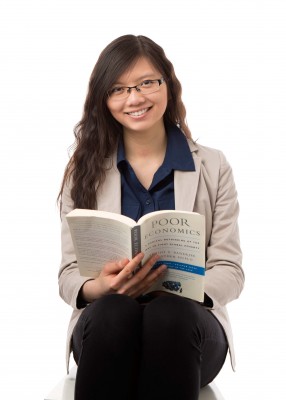Trang Hoang’s first opportunity to study race, gender, ethnicity, and class came during a course on human relations in the Cornell College education department. She graduated with a major in economics and business, but the conversations she had in that class are still informing her studies.

“My courses in education, politics, and psychology all offered different perspectives,” Hoang said. “Cornell allowed me to explore so many different fields.”
During economics and business professor Jerry Savitsky’s course on labor economics, Hoang worked on a project that explored the gap in wages between black and white workers. She learned how to use economic theory and statistical analysis to examine a social issue. Given enough data, she said, you can control for differences in qualifications and characteristics, and quantify the effects of those differences on wages. Eventually, she said, economists might be able to pinpoint economic impact that racial bias or discrimination has on the work force.
“There’s a lot of research on pay inequalities right now, but there is still much room for improvements in terms of data and analysis techniques,” she said. “My project was just a baby step.”
After graduation Hoang is going to Vanderbilt University to pursue a Ph.D. in economics. While there, she wants to continue working toward using economics to develop practical solutions to social problems and economic inequality, particularly in Southeast Asia. She hopes to return to Vietnam one day to work in her native country.
Her drive to find ways to improve the lives of others is more than academic. She was in the first group of peer educators at the college’s counseling center. She didn’t have much experience with mental health treatment or counseling, but she wanted to make other students’ lives better. The group developed ways to educate students about mental illness and the treatments available, and in the process Hoang said she learned the most important skill of her life.
“You have to put yourself in the other person’s position, and you can’t impose your ideas or experiences on other people,” she said.
She said that lesson made her a stronger resident assistant, a position she held for three years. She originally applied so that she could help first-year students find a supportive community. Toward the end of her first year as an RA, one of her residents, Addie Hubert, died in a car accident. She nearly didn’t apply for a second year, but in the end decided to because she didn’t want to end her RA experience on a negative note.
Hoang was accepted at a number of schools, and it was difficult for her to choose between Vanderbilt and her other top choice, Michigan State. One of the reasons she chose Vanderbilt was that the atmosphere reminds her of Cornell. Savitsky, who was her advisor, and economics and business professor Todd Knoop were hugely influential on her, she said, helping her with courses, and also with the process of navigating the sometimes overwhelming graduate school application process.
“When I was choosing a graduate school, I wanted to find another place like Cornell, where you can consider professors as friends. I saw relationships like that when I visited Vanderbilt,” she said. “I hope I can have a similar experience.”